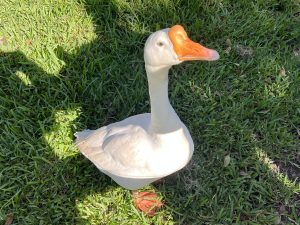 We each have our own unique view of the world. This goes for humans as well as animals and birds. During a recent visit to a farm-to-table restaurant in the country near Jacksonville, Florida, we gained some insights.
We each have our own unique view of the world. This goes for humans as well as animals and birds. During a recent visit to a farm-to-table restaurant in the country near Jacksonville, Florida, we gained some insights.
We had scheduled a private agritourism visit inside the enclosure to intuitively chat with animals and birds about their viewpoints on life. Upon arriving early, we decided to start up a conversation from outside the fence with whomever was available to talk. A very noisy goose quickly ran over to engage with us. He was aggressive and immediately upset with Greg.
I intuitively asked him, “Why are you so upset with Greg?” He answered, “This is my domain within this fence. Greg brings a lot of light. That’s impressive. But stay back and don’t enter here.”
His perspective was that Greg was a threat to his domain. He was going to put Greg down to keep control. His view of the world was that he needed to be the boss, and everybody else needed to be put in their place.
Did something in his past cause him to act this way? Had he been hurt? Just as with people, a bird’s past affects his view of the present situation.
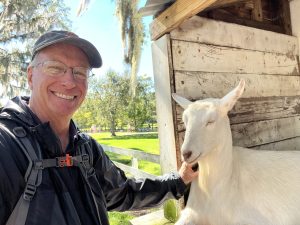 So, when it was time for our private tour, we decided to interact with the other farm animals and leave the goose alone. But the aggressive goose immediately raced up to Greg to force him out of the pen. Greg grabbed a small stick from the ground to defend himself. The guide put herself between them to protect Greg. She had to continue this for the rest of our visit.
So, when it was time for our private tour, we decided to interact with the other farm animals and leave the goose alone. But the aggressive goose immediately raced up to Greg to force him out of the pen. Greg grabbed a small stick from the ground to defend himself. The guide put herself between them to protect Greg. She had to continue this for the rest of our visit.
The goats, in contrast, looked numbed out. They said they were full and wanted to nap. They were too sleepy to chat. We mentioned this to our guide, and she said they had been gorging on pumpkins, which to them was like eating a Thanksgiving turkey feast.
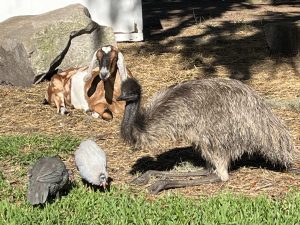 The emus (similar to ostriches), guineafowls, and ducks said they accepted their situation and were content with their lives. They had no thoughts on what life could be beyond the pen.
The emus (similar to ostriches), guineafowls, and ducks said they accepted their situation and were content with their lives. They had no thoughts on what life could be beyond the pen.
We left the enclosure, said goodbye to our guide and moved down the dirt path to a brown and a black horse who were near the fence. The brown one was getting a lot of attention from other visitors, so we went over to talk with him.
When I asked the brown horse, “How do you look at your life?” he said, “I’m here for work.” He didn’t elaborate, but he didn’t look like a work horse. I assumed his perspective was that he was the facility’s greeter, and that was his job.
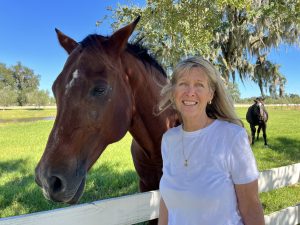 He went on to say, “There is a lot to look at. I see a lot of people go by ““ they walk back-and-forth. There’s a lot to do around here for people.”
He went on to say, “There is a lot to look at. I see a lot of people go by ““ they walk back-and-forth. There’s a lot to do around here for people.”
He questioned me, “Why are you talking to me for so long? People don’t usually stop and talk to me this long.” I told him it was because I thought he was sweet. He said, “People tell me that a lot.”
I asked, “Do you believe them when they tell you that you are sweet?” He answered, “Yes. Why wouldn’t I?”
I thought to myself, “He has a healthy perspective. He accepted the complement of sweetness with great self-worth and little ego. He was a sweet horse and he knew it. He glowed.”
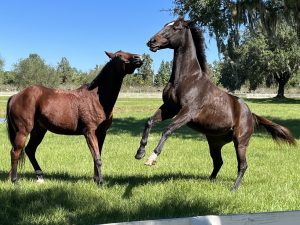 Just then the black horse, who had been mulling around on his own and not interacting much with humans, ran over to start a fight with our brown horse. He was jealous of the brown horse getting our love and attention. He raised up on his back legs and struck out. He did this multiple times until we finally had to leave the area to stop the fighting. He told to us that the brown horse shouldn’t be getting so much attention even though he didn’t want it for himself.
Just then the black horse, who had been mulling around on his own and not interacting much with humans, ran over to start a fight with our brown horse. He was jealous of the brown horse getting our love and attention. He raised up on his back legs and struck out. He did this multiple times until we finally had to leave the area to stop the fighting. He told to us that the brown horse shouldn’t be getting so much attention even though he didn’t want it for himself.
These farm animals had unique views. Some held healthy perspectives and others were competitive and controlling. Some were oblivious to their imposed limitations while others just wanted to sleep. The mentally healthy brown horse felt he had a purpose that he was fulfilling. This made him self-confident, kind-hearted and open for conversation.
This animal farm experience gave us insights into our own world views and perspectives.
Exercise in Perspective
Take a moment to go within and ask yourself about your perspective:
- How do you currently look at your world?
- How would you prefer to look at your world?
- What self-talk could you employ to create your preferred world?
- See and feel yourself in your preferred world.
- Give thanks for being the creator that you are.
